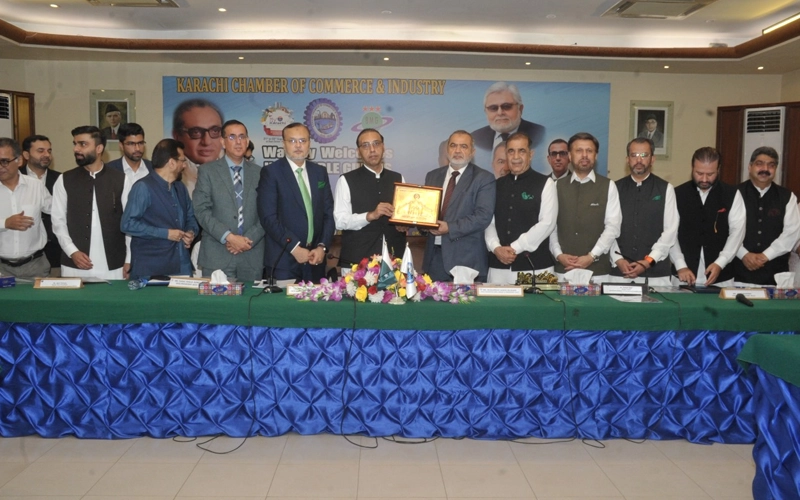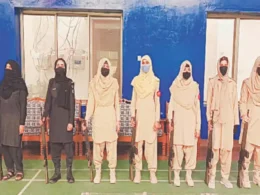In a powerful show of unity, two of Pakistan’s most influential business chambers, the Karachi Chamber of Commerce and Industry (KCCI) and the Rawalpindi Chamber of Commerce and Industry (RCCI), have joined forces to confront the escalating economic challenges faced by the business community.
During a high-level meeting held at the Karachi Chamber of Commerce and Industry on Tuesday, both chambers not only expressed strong opposition to the controversial Tax Ordinance (Amendment) 2025 but also called for the formation of a national alliance of chambers under Inter-Chambers Harmony Committee to amplify their collective voice and demand urgent pro-business reforms from the government.
This consensus was reached during the visit of RCCI delegation to KCCI to strengthen ties and chart a unified path forward. The meeting was attended by Chairman Businessmen Group (BMG) Zubair Motiwala, President KCCI Muhammad Jawed Bilwani, Senior Vice President KCCI Zia ul Arfeen, Vice President KCCI Faisal Khalil Ahmed, and members of the KCCI Managing Committee. Representing Rawalpindi Chamber were President RCCI Usman Shaukat, Senior Vice President RCCI Qazi Farooq, Vice President RCCI Fahad Barlas, Group Leader RCCI Sohail Altaf, and Executive Committee Members.
Chairman BMG Zubair Motiwala, who joined the meeting via Zoom, emphasized that fragmentation among chambers has historically undermined their influence. “We must raise a unified voice and work collectively to address the widespread challenges the business community is facing”, he stressed. Referring to controversial government directives such as SRO709, SRO350, and the Tax Ordinance (Amendment) 2025, Motiwala warned that such policies are creating an environment of harassment and uncertainty.
He proposed the formation of an Inter-Chambers Harmony Committee, comprising representatives from all chambers nationwide, to hold regular monthly meetings to deliberate on common economic issues. “Nearly 80 percent of the budget recommendations from all chambers highlight similar concerns. Instead of submitting them individually, we must consolidate our voices through this committee and forcefully present a unified front to the government”, he suggested.
President KCCI Jawed Bilwani, reflecting on his longstanding relationship with RCCI spanning over two decades, echoed the need for unified advocacy. He highlighted critical national economic issues such as soaring interest rates, excessive taxation, rising energy costs, and Pakistan’s deteriorating international reputation. “Unless we act in solidarity, these issues will persist and worsen under continued anti-business policies”, he warned, citing the Tax Ordinance (Amendment) 2025 as a clear example of such policies.
Bilwani also voiced concerns over the economic impact of Pakistan-India tensions, which are raising doubts among foreign buyers about the timely fulfillment of export orders. He underscored the alarming flight of capital driven by regressive tax policies, noting that thousands of businesses have been registered in the UAE in the past year alone. “The government’s claim of creating a digital, faceless FBR contradicts its actions. Empowering FBR officials to enter business premises will only increase harassment and corruption, negating efforts to create a tax-friendly environment”, he asserted.
President RCCI Usman Shaukat affirmed that the challenges being faced are shared by all chambers, necessitating a collective and strategic response. “The business community must act together. The government thrives on a divide-and-rule approach; we must break this pattern by collaborating consistently”, he emphasized.
He called for a Charter of Economy that includes measures to rebuild investor confidence, reverse capital flight, and encourage the return of skilled professionals. “Nationalism has to be exhibited to counter despair and negativity with constructive action,” he added.
While acknowledging some improvements in economic indicators such as rising remittances, declining inflation, and a recent 1 percent cut in interest rates, Usman Shaukat maintained that the cost of doing business in Pakistan remains unacceptably high due to persistently steep taxes, energy prices, and borrowing costs. “A united declaration from all chambers rejecting the Tax Ordinance Amendment 2025 is critical. RCCI strongly protests this ordinance, which introduces coercive tactics and reflects a mindset that continues to squeeze existing taxpayers instead of broadening the tax base”, he stated.
He appreciated the evolving role of the Special Investment Facilitation Council (SIFC), noting that its new focus on domestic investors alongside foreign investment is a welcome development. President RCCI invited KCCI’s leadership and Managing Committee to participate in RCCI’s flagship All Pakistan Chambers Conference, aimed at in-depth deliberations on national economic issues and future strategies.
Group Leader RCCI Sohail Altaf described the meeting as significant, marking the convergence of Pakistan’s two oldest and most influential chambers. He lamented that while the problems faced by the business community are well known, they remain unresolved due to disunity and lack of collective pressure on policymakers. “The business community must set aside minor differences and act as one. Our survival depends on unity, not individual agendas”, he remarked.
Sohail Altaf insisted that the business community must remain apolitical and demand resolution of issues based solely on merit, both within government structures and apex bodies like the Federation of Pakistan Chambers of Commerce and Industry (FPCCI). “The future of Pakistan hinges on industrialization, yet this area is being neglected. We’ve turned Pakistan into a consumer market instead of a producer”, he added.
To institutionalize cooperation, Sohail Altaf proposed that RCCI and KCCI explore signing a Memorandum of Understanding (MoU) to coordinate efforts on shared economic goals. “If these two major chambers come together, it will inspire others to follow suit. Let’s act for the collective interest of the business community,” he concluded.












